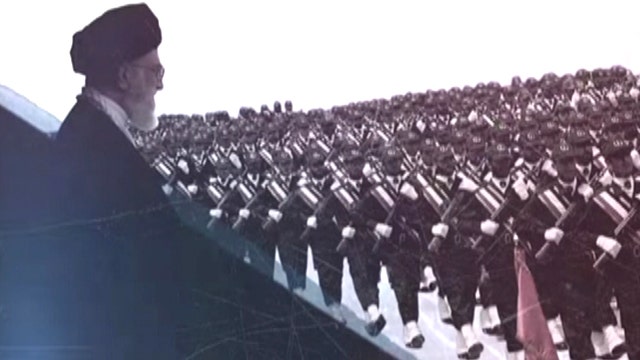Iran releases ISIS-like propaganda video
Supreme leader threatens U.S. on heels of nuclear deal
An attack that wounded four American soldiers Thursday in Egypt's Sinai Peninsula underscores the growing risks faced by the U.S. contingent stationed there and is likely to fuel an internal debate over whether they should be reinforced with heavier weapons to protect against ISIS.
Pentagon spokesman Jeff Davis said four U.S. and two Multinational Force and Observer (MFO) peacekeepers were injured in a pair of IED explosions in Northeast Sinai. The victims were evacuated by air to a medical facility where all are receiving treatment for non-life-threatening injuries.
“We wish all the wounded soldiers a speedy recovery,” Davis said Thursday night. “The safety and security of U.S. forces remains our top priority and we are committed to taking necessary steps for their protection.”
No group has taken responsibility for the attack, but the Islamic State has a well-known and active faction in the region, posing a complex security challenge for the peacekeeping force that has been there for decades. While much attention has been paid to the deployment of American troops back to Iraq to help fight ISIS, Americans make up the biggest component of the little-known international mission to Sinai -- in place since after the signing of the 1979 Israel-Egypt peace treaty. The roughly 1,700-strong force includes 650 American soldiers.
But with an ISIS offshoot flexing its muscle there, analysts warn they are hardly equipped to defend themselves against major attacks.
“They don’t have the built-up security you would normally have for force protection purposes, to defend against terrorists. They have bunkers there, but nothing to stop ISIS,” said former FBI agent Martin Reardon, who worked counterterrorism operations in the Middle East and is now vice president of the Soufan Group and based in Qatar.
While the Sinai is part of Egypt, the MFO is tasked with monitoring the terms of the 1979 peace agreement. The U.S. contingent there, by far the largest in the MFO (followed by Colombia with 358 soldiers and Fiji with 338), is made up of members of two infantry and logistics battalions. They mostly monitor and verify compliance and have little offensive capability. The force is mandated to be there unless in "imminent danger."
According to the Associated Press, the small force is armed with light weapons, armored personnel carriers, and “similarly limited materiel.”
Obama administration officials reportedly are reconsidering their options in the Sinai in light of the ISIS threat, including sending more weapons and equipment to reinforce the troops -- and even the possibility of withdrawing troops.
“This is not a combat force, it is a group of monitors and can be attacked,” Anthony Cordesman, senior national security analyst for the Center for Strategic and International Studies, told FoxNews.com.
“The problem here is there is nowhere in this region where there isn’t a potential risk. [ISIS] has shown they they are reasonably skilled planners and they can carry out attacks on forces with relatively little warning. What they can do to prevent it is a tough question.” What the administration must consider, too, he said, is whether this particular security situation is a priority.
A spokesperson for the National Security Council at the White House declined to comment on the situation Friday.
When asked if there was any talk about leaving, a Pentagon spokesman said simply, “no way.”
The security situation has been on a steady decline for nearly five years but worsened in recent months as the chief insurgent group there, Ansar Bayt al Maqdis, pledged allegiance to ISIS and changed its name to Sinai Province.
Since the Arab Spring resulted in the overthrow of Egyptian President Hosni Mubarak in 2011, there have been 17 major attacks with loss of life in the Sinai, mostly against police and Egyptian government forces. The Islamic insurgency continued to grow after former general Abdel Fattah al-Sisi tossed out and imprisoned elected President Mohamed Morsi in 2013, and all but eliminated the Muslim Brotherhood in Egypt, before becoming president himself.
Militants began turning their sights on the MFO in 2012. In March of that year, a MFO camp came under siege by a band of armed tribesmen for eight days, preventing food, water and supplies from reaching the peacekeepers. Six months later, 60 to 70 fighters broke into one of the bases, wounding four peacekeepers and seizing ammunition and communications equipment.
The Egyptian military has struggled to control the violence. In July, Sinai Province claimed credit for an assault on an Egyptian navy vessel anchored off the Sinai on the Mediterranean coast.
Also in July, the group launched a wave of attacks against government forces that resulted in scores of militants, soldiers and civilians killed. The operation, deemed the boldest and most sophisticated in decades, occurred in the north not far from the Gaza Strip and Israel.
But if the U.S. left, warned experts, it could leave a dangerous vacuum, and risk a violation of the 1979 agreement.
“The problem with pulling out U.S. troops is the signal it sends to the international community, that we felt threatened, and just left,” said Reardon.
According to 2014 numbers, about $80 million is spent on the MFO annually, with the U.S., Egypt and Israel paying the bulk of it – about one-third each – and 10 other countries also taking part with minimal troops and resources.
Fox News' Lucas Tomlinson and The Associated Press contributed to this report.













































